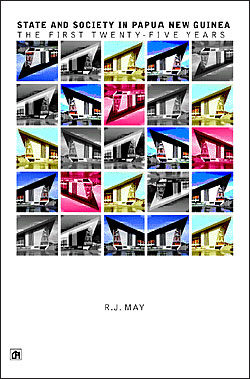State and Society in PNG The First Twenty-Five Years
On the eve of Papua New Guinea’s independence in 1975, there were many –
within the country and outside – who predicted political anarchy, with the possibility of an army
coup or authoritarian single-party dominance, and economic collapse. Such fears appeared to have
been justified when in 1975 the North Solomons (Bougainville) and Papua unilaterally declared their
independence. PNG, however, achieved a smooth transition, and in its first decade as a new state
enjoyed a high degree of political and economic progress. It remains one of the few postcolonial
states that has maintained an unbroken record of democratic government. Nevertheless, from the
mid-1980s a number of adverse tendencies became apparent, including: a decline in government
capability; increasing problems of urban and rural lawlessness; poor economic management, with
growing evidence of nepotism and corruption; environmental degradation associated with mining
and logging, and increasing pressure on land; and, from 1988, a rebellion on Bougainville. PNG
now faces instability on its western border with the Indonesian province of West Papua (formerly
Irian Jaya), and on its eastern border with Solomon Islands.
In September 2000, PNG celebrated twenty-five years as an independent nation. This volume
marks the occasion by bringing together a number of papers written by the author over this period,
and which address topics of central political concern. Most of the papers have been written in the
past few years, but a few provide historical perspectives on issues of contemporary debate. They
include reviews of the first decade of independence, of political economy up to the late 1990s, and
of internal and external security issues to 1998, and analyses of class, ethnicity, regionalism and
political parties, micronationalism, decentralisation and provincial-government reform, the changing
role of the PNG Defence Force and its involvement in the ‘Sandline Affair’, the emergence of
‘chiefs’ in contemporary politics, the origins of the Bougainville crisis, and PNG’s relations with
Indonesia over their common border. Historical chapters look at the role of the Reserve Bank of
Australia, under Governor H.C. ‘Nugget’ Coombs, in PNG’s decolonisation, at pre-independence
efforts towards ‘political education’, and at the emergence of nationalist literature in the early
1970s. A comparative chapter examines state, society and governance in PNG and the Philippines.
Against this background, an introductory chapter provides an assessment of where PNG stands at
the beginning of its next twenty-five years.
|
|

AUTHOR:
Dr R.J. May
STATUS:
Back List
PRICE:
$49.95
ILLUSTRATIONS:
n/a
FORMAT:
Portrait; softcover; viii + 450 pages
DIMENSIONS:
204 x 135 mm
ISBN:
1863332049
|
|

